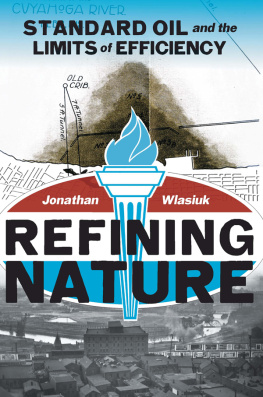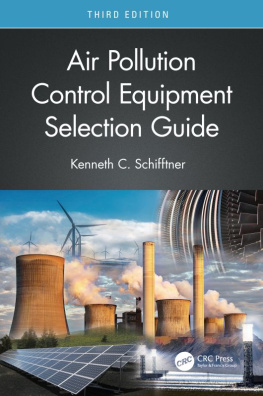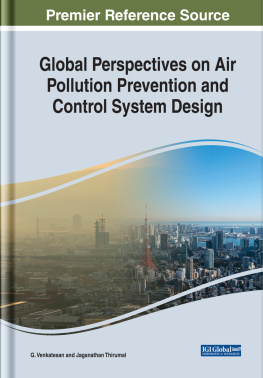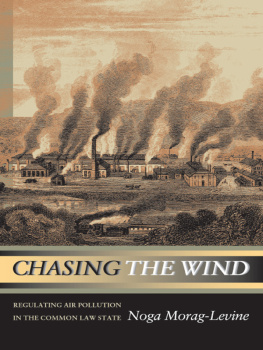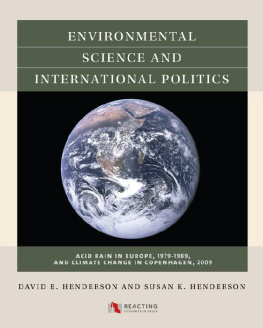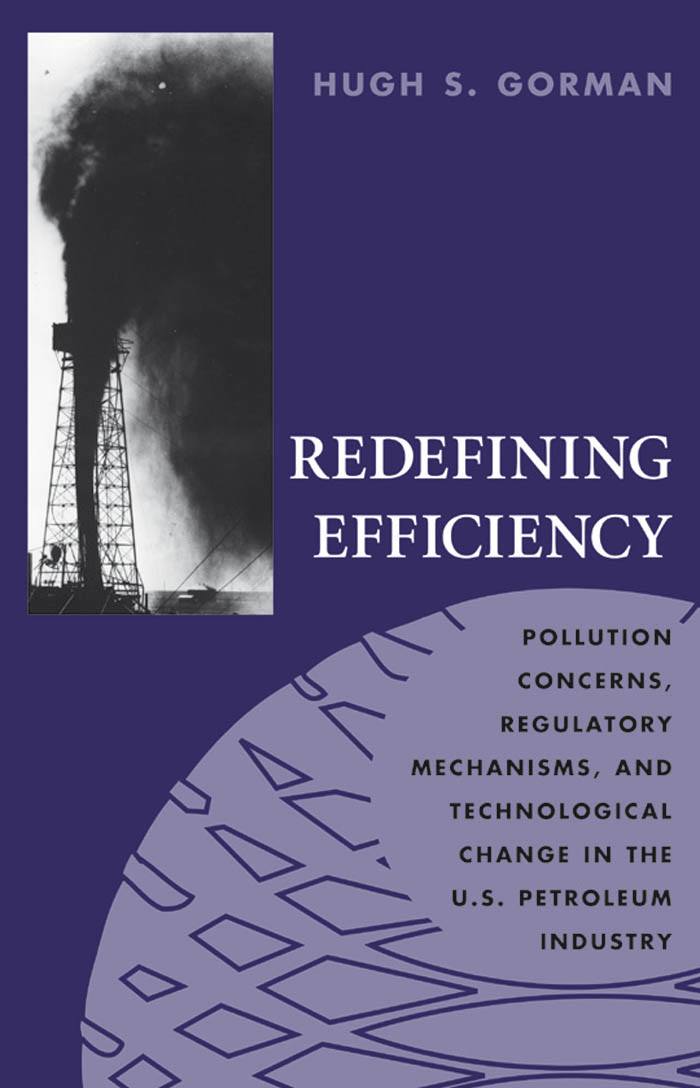REDEFINING EFFICIENCY
Series on Technology and the Environment
Jeffrey Stine, Mixing the Waters: Environment, Politics, and the Building of the Tennessee-Tombigbee Waterway
James Rodger Fleming and Henry A. Gemery, eds., Science, Technology, and the Environment: Multidisciplinary Perspectives
Joel A. Tarr, The Search for the Ultimate Sink: Urban Pollution in Historical Perspective
James C. Williams, Energy and the Making of Modern California
Dale H. Porter, The Thames Embankment: Environment, Technology, and Society in Victorian London
William McGucken, Lake Erie Rehabilitated: Controlling Cultural Eutrophication, 1960s1990s
Hugh S. Gorman, Redefining Efficiency: Pollution Concerns, Regulatory Mechanisms, and Technological Change in the U.S. Petroleum Industry

TECHNOLOGY
AND THE
ENVIRONMENT
JEFFREY STINE AND
JOEL TARR
SERIES EDITORS
HUGH S. GORMAN
REDEFINING
EFFICIENCY
POLLUTION CONCERNS,
REGULATORY MECHANISMS, AND
TECHNOLOGICAL CHANGE IN THE U.S.
PETROLEUM INDUSTRY
THE UNIVERSITY OF AKRON PRESS
AKRON, OHIO
Copyright 2001 by Hugh S. Gorman
All rights reserved
All inquiries and permissions requests should be addressed to the publisher,
The University of Akron Press, Akron, OH 44325-1703
Manufactured in the United States of America
First edition 2001
04 03 01 5 4 3 2 1
LIBRARY OF CONGRESS CATALOGING-IN-PUBLICATION DATA
Gorman, Hugh S. (Hugh Scott), 1957
Redefining efficiency : pollution concerns, regulatory mechanisms, and technonological change in the U.S. petroleum industry / Hugh S. Gorman.1st ed.
p. cm. (Technology and the environment)
Includes bibliographical references and index.
ISBN 1-884836-74-7 (hardcover) ISBN 1-884836-75-5(pbk.)
1. Petrolueum industry and tradeEnvironmental aspectsUnited States. 2. Industrial efficiencyUnited States. 3. Environmental protectionUnited StatesHistory. 4. PollutionLaw and legislationUnited States. I. title. II. Technology and the environment (Akron, Ohio)
TD195.P4 G67 2001
363.73'5765dc21
2001002140
The paper used in this publication meets the minimum requirements of American National Standard for Information SciencesPermanence of Paper for Printed Library Materials, ANCY Z 39.48-1984.
To my father
Contents
List of Figures
List of Tables
Preface
How has industrys response to pollution concerns changed over the course of the twentieth century? It is an important question to ask if we are to get beyond the stereotype of industrial firms being negligent in the years before systematic regulation and resistant in the years after. Although there is some truth to this characterization, it is just the skeleton of a much richer story. Putting a body of evidence on this skeleton not only brings that story to life but also provides new insights into the interaction of pollution concerns, regulatory mechanisms, and technological changes.
Here, I trace the response of a single industry, the U.S. petroleum industry, to pollution-related concerns over the course of the twentieth century. Few other industries can serve as a better window through which to view the changes that have occurred. Indeed, as Daniel Yergin has made clear in The Prize, petroleum flows through the veins of industrial society and the history of the twentieth century is intimately intertwined with efforts to control that flow. Yergin, of course, was interested in global politics, not pollution. But one can also use the petroleum industry to examine the history of pollution control.
In tracing pollution-related concerns associated with the extraction, transportation, and refining of petroleum, I asked the following questions:
What petroleum-related pollution concerns did people articulate at the beginning of the twentieth century and how did those concerns change over time?
How did decision makers in the petroleum industry respond to early pollution concerns in terms of legal arguments, changes in industrial practice, and technological innovation? How did general patterns associated with their responses change over time?
Over the course of the twentieth century, what technological and regulatory changes have influenced industrys response to pollution concerns?
The petroleum industry, of course, is not a monolithic actor. It consists of many different firms and organizations performing a variety of activities, each involving different technological, economic, legal, political, and social constraints. Still, in answering such questions, a coherent story emerges. What takes shape is not a simple story of enforcement and compliance but a process of debate, challenge, and discovery, resulting in the development of an industrial ecology that would have been unimaginable at the beginning of the twentieth century.
The historical record available to address these questions is scattered but voluminous. Numerous secondary sources exist. Many insightful and exhaustive histories of the petroleum industry, individual oil companies, and industry leaders have been written, as have histories of the various industry sectors, oil-producing and oil-refining regions, and petroleum-related technologies. The industrys regulatory historyespecially in regard to production rules, tariffs and quotas, and pricing regulationsis also well documented. Although these books do not focus on pollution-related issues, many make some reference to such issues. Government documents and government-sponsored reports that address petroleum-related pollution concerns also abound, usually related to one of the many controversies in which the industry has found itself embroiled over the course of a century. Petroleum-related treatises, textbooks, and trade magazines also mention pollution concerns and provide additional insight into changing public concerns and industrys response to those concerns.
The publicly accessible archival record is also interesting and informative. The corporate records of the Sun Oil Company, housed at the Hagley Museum and Library in Delaware, provide as complete a picture of an oil company as one could hope for. Furthermore, the private papers of industry executives can be found in archives scattered around the United States. In many cases, their papers contain extensive correspondence, minutes, and reports associated with their businesses, their positions in industry-related organizations, and their roles on various industry committees. Presidential libraries and the archival records of government agencies such as the U.S. Bureau of Mines and the U.S. Environmental Protection Agency also provide good access to relevant primary sources. Archived transcriptions of oral histories and various clipping files on petroleum-related environmental issues also proved useful. Finally, for insight into the details of the existing regulatory system, I examined the state-level wastewater and air emissions records of three refineries.
Funds for travel to the various archives have come from a variety of sources, including the National Science Foundation (NSF Grant 9422671), the Hagley Museum and Library, the Hoover Presidential Library Association, and a faculty development grant from Michigan Technological University. A second NSF grant (Grant SES-9817913) to research post-1970 changes associated with monitoring refinery effluents and emissions also contributed to the later sections of this book.


